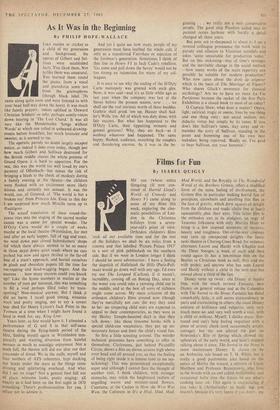As It Was in the Beginning
By PHILIP HOPE-WALLACE
The operatic parody no doubt largely escaped notice, as indeed it does even today, though just how much Gilbert and Sullivan destroyed for the British middle classes the whole premise of Grand Opera it is hard to apportion. For the rest, this was the world (so well loved by one's parents) of Offenbach—but minus the risk of bringing a blush to the cheek of modesty during a family evening at ,the theatre—the children were flushed with an excitement more likely bilious and certainly not sensual. It was the world, .too, of Gounod, cf. `The world is but a broken toy' from Princess Ida. Even to this day I am surprised how much Mireille turns up in Ruddigore.
The actual translation of these round-the- piano rites into the staging of the sacred secular canon was a cause for special wonder. The D'Oyly Carte would do a couple of weeks maybe at the local theatre (Wimbledon, for me) and after an early supper, full of egg and toast, we went down past closed haberdashers' shops (of which there always seemed to be so many in those days) down quiet roads where no cars parked but now and again thrilled to the far-off hiss of a tram's approach, and buried ourselves in plush and chocolate papers till the time for- toe-tapping and head-wagging began. And the encores .. . how many encores could you knock up? Like the hymn numbers at matins or the number of runs per batsman, this was something to fill a void perhaps filled today by train- spotting? Non-musical anyway. But I think it did no harm. I recall good timing, winsome ways and pretty singing, not to say a covert tear shed for Henry Lytton's Jack Point in the Yeomen at a time when I might have found it hard to week for, say, King Lear.
Years later, as fate would have it, I attended a performance of G and S in that self-same theatre during the flying-bomb period of the blitz, finding myself again in Wimbledon tem- porarily and wanting. diversion from hateful menace as much as nostalgic enjoyment. Not a tenth full, the theatre still did not shut out that crescendo of dread. We in the stalls, myself and four mothers of ATS usherettes, kept ducking our heads under the seats as the things came droning and spluttering overhead. And what did I see an stage? Not a genteel foot fall out of place, winsome looks, pretty singing: all exactly as it had been on the first night in 1870 something. There's professionalism for you. I refuse not to admire it.
And yet I quite see how many people of my generation must have loathed the whole cult, if only as a transferred Vaterhass or rejection of the forebear's generation. Sometimes I think of that line in Henry VI in Jack Cade's rebellion. 'Go some and pull down the Savoy' would not be too strong an injunction for Many of my col- leagues.
It is easy to see why the ending of the D'Oyly Carte monopoly was greeted with such glee. Now, it was said—and it's as little while ago as last year when the company was last at the Savoy before the present season, now . . . we shall see the real intrinsic worth of these baubles. Guthrie shall prink 'em up, Hauser shall Sad- ler's Wells 'em. All of which was duly done, with fair success. But what has happened to the D'Oyly Carte, their tipputting minuets and genteel gestures? Why, they are back—as if nothing whatever had happened. The same happy, flushed, audience, mouthing the couplets and thundering encores. As it was in the be-
ginning . . . we really are a very conservative people. The good ship Pinafore sailed into its painted ocean harbour with hardly a detail changed all these years.
But pens are re-sharpened to abuse it. I see a revered colleague pronounce the work with its parody and allusion to Victorian scandals and jokes `quite unsuitable for production today.' But on this reckoning—that of time's revenges and the inevitable change in the social outlook —how many works of the main repertory can possibly be suitable for modern production? Who now cares about the draft de seigneur which is the basis of The Marriage of Figaro? Who shares Gluck's reverence for classical mythology? Are we to have no more La Vie Parisienne because the racket of the first Paris Exhibition is a closed book to most of us today?
0 Captain Shaw, what does it matter? Opera, light, satirical, tragic or comic, lives by one thing and one thing only: not social realism, not didactic virtue but simply by its tunes. If you don't like Sullivan's tunes, stay away and re- member the story of Sullivan, standing in the prom and humming one of his own best melodies, being reproved. 'Really sir, I've paid to hear Sullivan, not your hummin'.'






























 Previous page
Previous page